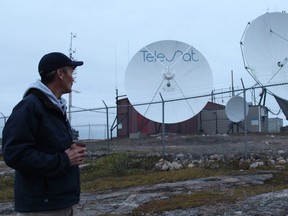On Friday, the Liberal government announced a $2.14-billion loan to Telesat, a Canadian communications company based in Ottawa.
Article content
Canada’s industry minister dismissed on Saturday as “nonsense” Elon Musk’s suggestion that his satellite company, Starlink, could provide Canadians with internet access at a fraction of the federal government’s newest plan.
On Friday, the Liberal government announced a $2.14-billion loan to Telesat, a Canadian communications company based in Ottawa. The money is aimed at helping Telesat’s low Earth orbit satellite boost reception, particularly for Canadians in remote parts of the country.
Advertisement 2
Article content
Prime Minister Justin Trudeau celebrated the Telesat deal, telling reporters it is “fundamentally about making sure that Canadians and people in more distant communities, in smaller northern communities and in remote parts of the world can be connected to the transformation and the progress that the world is seeing at increasingly destabilizing speeds.”
A federal government press release touted that the deal would lead to “supporting 2,000 jobs across the country through Telesat and its supply chain,” in a move hailed by François-Philippe Champagne, the minister of innovation, science and industry.
Recommended from Editorial
“As the largest space program ever conceived and built in Canada, this agreement with Telesat Lightspeed will have a significant impact on the growing network of Canadian suppliers and talent, offering critical support to the sector as it continues to flourish,” Champagne noted upon the deal’s announcement.
The deal was condemned by Conservative MP Michael Barrett, representing the Leeds-Grenville-Thousand Islands and Rideau Lakes riding, who asked Musk online to weigh in on the matter.
Article content
Advertisement 3
Article content
“Hey @elonmusk — how much would it cost to provide @Starlink to every Canadian household that doesn’t have high speed?” the parliamentarian asked on X on Saturday morning. “If this $2.14 BILLION plan is the panacea of expanding access, competition, and service — where is the interest from private investors and banks?”
The billionaire founder of Tesla responded to Barrett later in the day, asserting that Starlink could have provided the service for, “Less than half that amount.” Musk’s comments prompted Barrett to call it “a common-sense solution for Canada.”
Advertisement 4
Article content
The exchange drew the ire of Champagne, who denounced Barrett’s challenge by taking a shot at Conservative Leader Pierre Poilievre.
“Typical (Pierre) Poilievre ‘nonsense,’” the industry minister weighed in on Saturday night. “They’d prefer giving money to foreign billionaires instead of supporting our industry and our workers. This loan will help build a world-class Canadian made satellite network and supports thousands of jobs in Quebec! Now that’s common sense!” Champagne added in a pinned post on his X profile.
A similar deal inked by the federal and Ontario governments last August awarded Rogers Communications $215 million to expand its fibre-optic network for rural communities across the province. According to the National Post’s Tristan Hopper, had Starlink instead been commissioned to connect the roughly 66,000 houses to their satellite grid, it would have cost Canadians under $50 million.
In July, Musk boasted on X — a social media platform he bought last year — that Starlink was serving “more than 400k active Canadian customers,” representing roughly three per cent of households across the country.
Advertisement 5
Article content
Internet speeds across the Starlink network of more than 6,000 satellites range from 25 to 220 MBps. Canadian residential users pay over $100 monthly for access to Musk’s expanding network with vehicle-mounted roaming plans across North America as high as $250. The company plans on having over 40,000 satellites in orbit.
Our website is the place for the latest breaking news, exclusive scoops, longreads and provocative commentary. Please bookmark nationalpost.com and sign up for our politics newsletter, First Reading, here.
Article content








